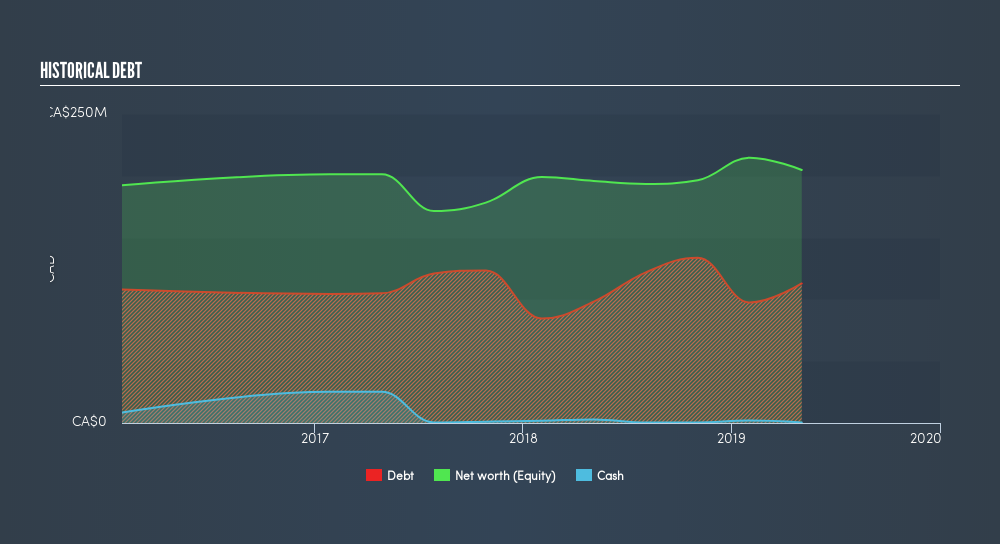
Legendary fund manager Li Lu (who Charlie Munger backed) once said, 'The biggest investment risk is not the volatility of prices, but whether you will suffer a permanent loss of capital.' When we think about how risky a company is, we always like to look at its use of debt, since debt overload can lead to ruin. As with many other companies Roots Corporation (TSE:ROOT) makes use of debt. But is this debt a concern to shareholders?
Why Does Debt Bring Risk?
Debt is a tool to help businesses grow, but if a business is incapable of paying off its lenders, then it exists at their mercy. In the worst case scenario, a company can go bankrupt if it cannot pay its creditors. However, a more common (but still painful) scenario is that it has to raise new equity capital at a low price, thus permanently diluting shareholders. Of course, plenty of companies use debt to fund growth, without any negative consequences. When we examine debt levels, we first consider both cash and debt levels, together.
See our latest analysis for Roots
What Is Roots's Net Debt?
As you can see below, at the end of May 2019, Roots had CA$112.9m of debt, up from CA$99.0m a year ago. Click the image for more detail. Net debt is about the same, since the it doesn't have much cash.

How Strong Is Roots's Balance Sheet?
The latest balance sheet data shows that Roots had liabilities of CA$67.7m due within a year, and liabilities of CA$241.2m falling due after that. On the other hand, it had cash of CA$495.0k and CA$5.38m worth of receivables due within a year. So its liabilities total CA$303.0m more than the combination of its cash and short-term receivables.
The deficiency here weighs heavily on the CA$130.2m company itself, as if a child were struggling under the weight of an enormous back-pack full of books, his sports gear, and a trumpet. So we definitely think shareholders need to watch this one closely. At the end of the day, Roots would probably need a major re-capitalization if its creditors were to demand repayment.
We use two main ratios to inform us about debt levels relative to earnings. The first is net debt divided by earnings before interest, tax, depreciation, and amortization (EBITDA), while the second is how many times its earnings before interest and tax (EBIT) covers its interest expense (or its interest cover, for short). Thus we consider debt relative to earnings both with and without depreciation and amortization expenses.
Roots's debt is 3.2 times its EBITDA, and its EBIT cover its interest expense 3.0 times over. This suggests that while the debt levels are significant, we'd stop short of calling them problematic. Even worse, Roots saw its EBIT tank 40% over the last 12 months. If earnings continue to follow that trajectory, paying off that debt load will be harder than convincing us to run a marathon in the rain. The balance sheet is clearly the area to focus on when you are analysing debt. But it is future earnings, more than anything, that will determine Roots's ability to maintain a healthy balance sheet going forward. So if you want to see what the professionals think, you might find this free report on analyst profit forecasts to be interesting.
Finally, a company can only pay off debt with cold hard cash, not accounting profits. So we clearly need to look at whether that EBIT is leading to corresponding free cash flow. Over the last three years, Roots reported free cash flow worth 14% of its EBIT, which is really quite low. That limp level of cash conversion undermines its ability to manage and pay down debt.
Our View
To be frank both Roots's EBIT growth rate and its track record of staying on top of its total liabilities make us rather uncomfortable with its debt levels. And even its conversion of EBIT to free cash flow fails to inspire much confidence. After considering the datapoints discussed, we think Roots has too much debt. While some investors love that sort of risky play, it's certainly not our cup of tea. Given our concerns about Roots's debt levels, it seems only prudent to check if insiders have been ditching the stock.
If you're interested in investing in businesses that can grow profits without the burden of debt, then check out this free list of growing businesses that have net cash on the balance sheet.
We aim to bring you long-term focused research analysis driven by fundamental data. Note that our analysis may not factor in the latest price-sensitive company announcements or qualitative material.
If you spot an error that warrants correction, please contact the editor at editorial-team@simplywallst.com. This article by Simply Wall St is general in nature. It does not constitute a recommendation to buy or sell any stock, and does not take account of your objectives, or your financial situation. Simply Wall St has no position in the stocks mentioned. Thank you for reading.
About TSX:ROOT
Roots
Designs, markets, and sells apparel, leather goods, footwear, and accessories under the Roots brand in Canada and internationally.
Excellent balance sheet and fair value.
Market Insights
Community Narratives





